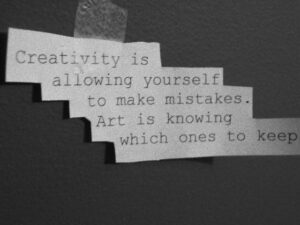Posts by Matthew Norman
Back when I used to work in advertising, I routinely found myself at photo or commercial shoots that appeared to be unequivocal disasters. A freezing fitness model wearing a thin running tank top in March in Baltimore. A professional golfer on a beautiful day in Texas bundled up in a rain-proof jacket. A red sweater that needs to be blue because of a problem in a factory on another continent. A midday that’s meant to be sunrise.
As a copywriter I was a natural-born pessimist, so in these situations I’d always look with trepidation at one of the art directors. “Dude, chill,” they’d say. “We’ll fix it in post.”
I was reminded of that expression last year after finishing the first draft of my sixth novel. I’d pitched the book as a holiday love story about a grieving widow and widower who find comfort and eventual happiness while binge watching classic Christmas movies together. A few weeks after I turned it in, when my editor called with her feedback, our conversation started out great. The draft was funny, heartfelt…etcetera.
“I do have some notes, though,” she said.
I’ve been at this long enough to know that editors always lead with what’s good, so I was prepared for that. Still, though, I held my breath.
“Your main characters don’t really watch that many movies together,” she said.
I kept not breathing as she noted the exact number of movies watched. It was, indeed, not many.
“And, you know,” she continued, “for a love story, they spend almost no time together until the very end. And, well, there’s not a lot of Christmas stuff going on, is there? You’d think there would be, it being December and all…and a holiday book.”
I made a noise like, “Hmm,” as my vision blurred from lack of oxygen.
“Oh, and also,” she said, “you’re ugly.”
Okay, she didn’t say that last bit, but her point was clear, and she was absolutely right: I had a lot to fix in post.
We all know that first drafts are never perfect, and revision is as much a part of the writing process as carpel tunnel syndrome and printer jams. But here are some tips for handling big revisions, the full-on rewrite kind, the ones that make you wonder if your first draft is…well, too much of a disaster to even save.
Revisit Your Pitch
A pitch is really just a bunch of promises, right? Maybe your pitch is a formal document saved on your computer. Maybe it’s just a collection of thrown-together thoughts saved in your head. Either way, go back and look hard at the promises you made about the book you planned to write. You promised that it’d be about something. It would feel a certain way—tonally, esthetically. It would fit into the literary landscape somehow, either through genre or comparative titles. Readers would care about it for several very specific reasons. Go through each promise and ask, “Did I deliver on that one?” Make a list of every time the answer is no, then start your revision there.
For me, I’d wandered away from my book’s fundamental hook to the point of abandonment. It was going to take some effort, but my main characters—their names are Grace and Henry, by the way—were going to […]
Read More
The key to getting anything out of essays like this about writing is to tweak the specifics to meet your individual circumstances. While it’s clear who I’m writing about here, the sentiment can apply to nearly anyone or anything. If there’s an external force in your life that you know is hurting you and your writing, do everything you can to simply turn it or them off. The burden won’t go away entirely, but I promise you it’ll ease.
Back in November 2016, on the night that He Who Shall Not Be Named somehow became President Elect of the United States, I was plunged instantly into the worst writing drought of my professional life.
(Oh, right, I probably should’ve started with a trigger warning. If you count yourself among the “Shut up and dribble” crowd, you might want to move along.)
I was well into the first draft of my third novel, LAST COUPLE STANDING. I wasn’t an outliner back then, but I had the plot and character arcs all laid out in my mind. Every time I sat down to work, though, the words simply wouldn’t come. For starters, the sadness I felt—something akin to mourning—had left me listless and completely void of intellectual energy and curiosity. Worse, though, the need to follow the chaos of those weeks and months in real time on social media and cable news had stripped my attention span down to its bare minimum. The country was a continuous car crash, and I couldn’t look away.
As time passed, as the cursor kept blinking, as the pages went unfilled, I knew that if I ever wanted to write another meaningful sentence of prose again, I’d need to make some changes.
Nine years later now (Nine years?!), as we enter what is sure to be among the most distracting months of our lives, I thought it might be helpful to share what I did to get through that administration, a deadly worldwide pandemic, the gutting of the Supreme Court, the stressful election of Joe Biden, a full-on insurrection, the overturning of Roe vs. Wade, the end of President Biden’s re-election bid, and, so far, another ugly political season of constant car crashes.
Turn Him Off
I don’t specifically remember when I decided to never watch HWSNBN again. Whenever it was, though, I’d seen enough to know that watching and listening to him speak for more than ten consecutive seconds had the power to upend my mood, ruin my day, and pulverize any chance I had of getting work done. So, one afternoon in 2017, I told my wife that I was done with him forever. She laughed, assuming I was kidding—or at least exaggerating. I assured her, though, that I was dead serious. I’m happy to report that to this day I’ve kept that promise. I catch bits here and there, of course, because it’d be impossible not to. I haven’t watched a single HWSNBN press conference, though. None of his State of the Union addresses either. No debates, town halls, rallies, interviews, or speeches. No nothing since. I’m a more productive writer for it, and, more importantly, I’m a happier one, too.
Turn Them Off, Too
Turning HWSNBN off was actually pretty easy in retrospect—and downright refreshing. Because, however, […]
Read More
There’s a band from Chicago called Wilco that I’ve been in love with my entire adult life. If you’ve heard them, you know what I mean. If you haven’t, maybe you’ve heard their music pop up in movies and TV shows, like Ted Lasso and, most recently, The Bear.
Back on June 20th, my wife and I gave our kids some pizza and permission to stream as many movies as they wanted and made the trip from Baltimore down 1-95 to see Wilco perform at an outdoor amphitheater in Virginia. They were, as always, terrific.
Early on in the set—their seventh song, but who’s counting?—the band played “I Am Trying to Break Your Heart,” a hit off their album Yankee Hotel Foxtrot. Generally, most Wilco songs are fairly straightforward. Much of IATTBYH, though, at least lyrically speaking, makes very little sense, and that’s a good thing. Here’s how it starts:
I am an American aquarium drinker
I assassin down the avenue
I’m hiding out in the big city blinking
What was I thinking when I let go of you?
You get three lines of poetry here—lovely and random. But then, my god, that fourth line. It’s crystal clear, pitch perfect, and, in lead singer Jeff Tweedy’s voice, it’s an emotional stunner. My eyes welled up as he sang those words in Virginia, and, embarrassingly, they’re welling up a little now as I write this. Damn you, Jeff!
My point—along with humble bragging about getting to see a sick concert—is that emotion is what makes art so powerful, and, as writers, it’s our job to deliver that emotion as much as we can. Here are some tips for doing that and for turning up the volume on all those feelings in your work.
Hit ‘Em in the Heart, Not the Head
As we know, reading and writing are intellectual exercises, practically by definition. But reading and writing are very much emotional exercises, too. Think about the last few books you read that you didn’t particularly care for. Technically, on a sentence-to-sentence level, those books may have been written well and drafted with great effort and care by professionals. I’m willing to bet, though, that in most cases the authors of those books failed to create characters with whom you connected emotionally or failed to create situations or scenes that made you feel something—at least something worthwhile.
So many of the words and sentences we write in longform pieces—fiction or nonfiction—are the equivalent of nuts and bolts in construction. We’re presenting necessary information. We’re orienting our readers in time and space. We’re erecting the metal posts required to keep our plots from crumbling to the ground. While all of that is important and necessary, never forget that there will be an actual person reading it. As you write and revise, constantly ask yourself: Is this making the reader think or feel? Good writing can do both, of course, just as good writing can be intellectual as hell. But if you’re not skewing toward emotional relevance your reader’s attention will eventually drift.
Be Revealing with Your Characters
Your characters need to want things. Duh. Their motivations will propel the engine that drives your plot. However, your characters are also human—let’s assume—and that means that they love some things, too. […]
Read More
Back in March 2020, as we collectively sprayed our groceries with Clorox, I wrote an essay for my friends here at Writer Unboxed called “Confessions of a Former Anti-Outliner” in which I presented my case for why outlining novels before writing them is just about the greatest thing ever. In the four years and two outlined novels since, I’ve become even more self-righteous on the subject. As far as I’m concerned you lawless hooligans who write by the seat of your pants should be sent to some sort of minimum-security book prison.
Recently, though, something unexpected happened that caused me to question my hardline stance on pre-planning books: as I wrote the first draft of my sixth novel, my outline fell apart before my very eyes.
While I haven’t ultimately changed my position on the benefits of literary roadmaps, being led so far astray by my own has reminded me that works in progress are incredibly delicate things. Whether you’re a tried-and-true outliner like me, a sticky note aficionado, a note card junkie, or just some lunatic who guzzles caffeine and wings it, our best laid plans are often imperfect, and eventually you’re going to find yourself off course and plunged directly into chaos.
Here’s what you can do when that happens. Oh, and I’ll do my best to keep this driving analogy going for as long as I can.
Heed the Warning Signs
Back to the delicate thing. Works in progress are essentially unreliable vehicles held together by little more than duct tape and goodwill, so little, obvious problems will pop up and a daily basis. Don’t worry, you can deal with those in revision. The large-scale issues, though—the structural problems that you can’t just speed right by—often reveal themselves more subtly. In my experience, warning signs for hazards like these often manifest themselves as nagging little voices in my head. If you’ve been at this for a while, I bet you have a few of those voices, too. While they can often be the enemy of progress, if your voices keep saying the same things over and over, maybe you should turn the car stereo down and give them a listen.
In my case, for Novel #6, every time I sat down to work, my voices would say, “You’re waiting too long to introduce Dom and Meredith, you know.” (For context, Dom and Meredith are good-looking pretend people whose fictional existences hinge on preventing my male and female leads from getting together.)
“Shut up,” I’d reply. “I’ve got this all planned out. I wrote an outline. I printed it out and everything. See?”
My voices thought that was hilarious. “Oh, and by the way,” they said, “your order of events doesn’t make any sense. Where, exactly, did you learn to write books?”
Stop the Car!
I highly recommend avoiding the authorly impulse to try to solve your problems by continuing to furiously write in the wrong direction. When you’ve officially lost your way, it’s time to pull over. With your car idling and the A/C blasting, make a list—either literally or just in your head—of all the things those voices have been telling you. Yeah, they’re nagging, but sometimes they make some good points.
Find a Rest Stop and Hope They Have a Bar
I’m kidding […]
Read More
Earlier this year, my wife and I noticed that something had changed with the way our eleven-year-old daughter was playing lacrosse. The spirit and joyful recklessness that we’d seen on the field the previous season had been replaced by an unfamiliar tentativeness. Where she once sprinted like a mad woman, she now jogged. Where she once fired shots at will, she now passed to teammates who were no more open for a shot than she was. Where she once reacted instantly, she now appeared always to be toggling through some invisible checklist in her head.
In the car after games, we were supportive, of course, because she’s eleven and we aren’t monsters. Kids are kids, right? They go through stages. Their bodies change. Their energy levels fluctuate. As the trend continued, though, we started asking questions.
I should note that although we were both athletic as kids, my wife and I know virtually nothing about lacrosse. Growing up where we did in the 80s and early 90s—me in Nebraska, her in way-upstate New York—lacrosse simply didn’t exist. Consequently, our questions were limited to generalities. “Why haven’t you been running as hard lately?” “Did you not realize you had an open shot there in the second half?” “Are you having fun? Because sometimes it kinda looks like maybe you aren’t.”
Like a lot of kids, our daughter often turns quiet and sullen in the face of even the gentlest criticism. When it came to this, though, she was quick to defend herself. “You don’t sprint all the time in lacrosse. Plays have to develop.” “They want us to pass more. We get in trouble if we shoot too much.” “It’s not like I can just goof off out there. I gotta pay attention to stuff.”
To me, a middle-aged man who hasn’t played an organized sport since dial-up modems were the rage, every word out of her mouth sounded like classic overthinking. I tried to articulate this in a way that I thought might make sense to a kid. It was toward the end of the season, and we were arriving at a tournament. Before my daughter hopped out of the car to join her team, I stopped her and said, “Just go out there and be an athlete, babe.”
I realized immediately, goddammit, that I was totally talking to myself. Ugh.
AN UNFAMILIAR TENTATIVENESS
Some context. Back in June, I published my fifth novel, Charm City Rocks. I’m not going to overstate how well the book has done—sales have been modest, at best—but so far, it’s made a much larger splash than any of my previous work. Early buzz was great and included some starred reviews. People Magazine featured it on their “best books of the week” list, which marked the largest media hit of my career by a longshot. The book went into a second printing, which, I’ll be honest, I barely even knew was possible. I got invited to bookstores and to zoom with book clubs all over the country. Additionally, at least anecdotally speaking, Charm City Rocks picked up traction on social media in a way that’s been entirely new for me. My other four novels tended to go on sale on Tuesday then pretty much be gone by Friday […]
Read More
How’s this for a guilty pleasure? One of my go-to pastimes for the last ten years has been going on Amazon, searching up my all-time favorite books, movies, and albums, and obsessively reading every single one-star review. I have no idea what this says about me, but it’s probably not 100% healthy.
Just ballparking the numbers here, one-star reviews of brilliant things tend to breakdown like this: 25% of them are complete nonsense, 25% miss the point entirely, and 25% have nothing whatsoever to do with artistry. The Great Gatsby has too much drinking in it. Did the White Album really need all those songs? My Pulp Fiction Blu-ray arrived a day late! You know, that kinda thing. Inevitably, though, that last 25% of one-star reviews will include well-reasoned, artfully written, totally not ridiculous arguments for why many of the things I love so much are actually huge pieces of crap. The lesson here is simple, and I’ll adjust it for the fact that this is a site about writing: No book is for everyone.
We all know this, of course. It’s an important phenomenon to reiterate, though, because getting feedback from early readers is among the most essential steps in the writing process. However, as the one-star bandits of Amazon have shown us time and again, not all feedback is created equal, and, well…sometimes haters gonna hate.
Finding the “Right” Early Readers
If you’re an established writer—or if you’ve just been at it for a long time—you may already have a team of trusted early readers in place. For many of us, though, finding people to read our initial drafts can be a challenge. Often the impulse—believe me, I’ve been there—is to thrust your typo-ridden Microsoft Word doc into the inbox of the first literate, willing, seemingly able-brained person you find. My advice: take a pause, maybe run spellcheck, and ask yourself three simple questions:
Listen, I understand that diversity of thought is a good thing, and cherry picking your own cheering section won’t elicit a worthwhile critique of your work. That said, giving your book to someone who has zero chance of liking it can be one of the most destructive things you do to yourself as a writer. Let’s dig into these questions one by one as we develop a strategy for choosing early readers who are right for you.
Avoid Idiots
I’m (mostly) kidding about the idiot thing. If you give your manuscript to a known idiot, that one’s on you. And if you give it to someone who later proves themselves to be an idiot…well, live and learn. But it’s important to choose early readers who get you, your artistic goals, and literature in general enough to be able to effectively assess your work. Maybe ask them to recite the last one-star review they posted on Amazon.
Identify Triggers Upfront
An important thing I’ve picked up on from my years of rage-reading one-star reviews is that readers—even good, thoughtful ones—sometimes have triggers that can completely derail their reading experience and disproportionality affect their opinion of a book. Religion, lack of religion, politics, swearing, sex, infidelity, drug use, […]
Read More
When people find out that I’m a novelist they often have some follow-up questions. This makes sense. Mathematically speaking there aren’t that many of us per capita—like stunt people or tree surgeons—so I’m usually the only novelist that a given person has ever met.
There are a lot of questions about where I get my ideas. I wish I knew; I’d go there more often. Others want to know if there’s any money in writing novels, which is usually when I offer them a ride in one of my Lamborghinis. The question I get most, though, is: “When did you decide to become a writer?”
This is a tough question, because it’s virtually impossible to answer without sounding overly serious, like I should be speaking in a European accent and smoking one of those long, skinny cigarettes. The truth is, I never decided to become a writer, I just always was one. I know, right? Obnoxious.
I’m willing to bet that many of you reading this will recognize the following trajectory, adjusted, of course, for your respective form. I wrote stories and read them aloud to my parents when I was still scribbling in pencil. I started submitting to and being rejected by literary journals during high school. And I took my first crack at a novel-length manuscript in college. I didn’t formally decide to do any of these completely illogical things, I just kinda did them. Writing is the thing, for better or worse (often worse), that I’m meant to do.
That said, I’ve made countless decisions both big and small along the way that have allowed me to continue being a writer. The following are some of the most important ones. If you’ve been at this for a while, I bet you’ll recognize a few of these, too. And if you’re new to writing…well, here’s what you’ve got to look forward to.
I Tried…But Not Too Hard
Unless you’re the descendant of shipping tycoons or British royalty, you probably have a day job. In my early twenties I chose advertising copywriting, and for a few years it was a pretty sweet deal. I’d write brochures, taglines, and radio scripts by day, then I’d work on my own writing at night and on weekends. I was young and inexperienced, and—at least professionally speaking—nobody expected that much from me.
Eventually, though, years of general competence added up, and well-meaning managers started wanting me to do more. (Wait, what?) In the face of potential promotions and increased responsibility, I was forced to make one of my first adult decisions as a writer. I would be good enough at my advertising job to stay employed and properly housed, but I wouldn’t be so good that people wanted to actually put me in charge of things. From that day forward, I kept my head down, I did my work, and I avoided climbing whatever corporate ladders were placed before me.
As easy as this might sound in theory, the trouble with corporate ladders is that there’s often tempting things up there, like more money and prestige and offices with actual doors. I knew myself well enough, though, to know that a more stressful, time-consuming job would slowly and surely cannibalize the energy I needed to focus on […]
Read More
About a hundred years ago when I was finishing my senior year of high school, my dad and I had a very important conversation about my future.
My parents knew that I wanted to be a novelist. How could they not? It was practically all I’d talked about since I was old enough to hold a pencil. I wrote stories incessantly, I was the editor of my high school’s literary magazine, I took a typing class during summer school once so I could write faster, I bought t-shirts with authors’ faces on them, and, of course, I read and read.
As supportive as my parents were, they were also very practical people. They still are, especially my dad. Although not a man of the arts himself, he understood that no one was going to pay me for trying to be a novelist. Even under the best of circumstances, he knew, it takes years for writers to get paid, if ever, and those who do often make very…very little.
He was right, by the way—on all counts. I didn’t sell my first novel, Domestic Violets, until I was in my early thirties, and after paying taxes and my agent, I took home about enough to buy a nice IKEA bedroom set.
As a way to avoid a life of abject poverty, my dad suggested that I major in advertising and pursue a career as something called an “advertising copywriter.” From his perspective it was a pretty sweet deal. I’d be a writer and I’d get paid an actual salary that I could live on and buy things with. Then, on nights and weekends, I’d be free to work on my own writing.
When you’re eighteen years old, it’s easy to immediately dismiss everything your parents say, because what the hell do they know, right? Well, thankfully I skipped that part and declared my dad a freaking genius. And then I went ahead and did exactly as he suggested.
AN ADVERTISING NOVELIST
There’s that line in “Piano Man” where Billy Joel sings about a “real estate novelist.” I’m not entirely sure what that is, but for more than twenty years I was…well, an “advertising novelist.” And I’m not ashamed to say that I enjoyed it very much. I was good enough at writing ads to keep getting promotions, I made enough money to live comfortably, and I even got to meet a few celebrities along the way.
Looking back on those years among my fellow caffeine-blitzed advertising creatives, I’ve come to realize that copywriting wasn’t just something I did on the side to pay the bills. Truth is, advertising, for better or worse, helped shape my work habits as a novelist, my relationship with the tricky business of criticism, and my attitude toward being paid to write. Here are a few takeaways.
Read More
Like many people around the world, I’ve been watching Peter Jackson’s documentary The Beatles: Get Back. Notice I said, “I’ve been,” as in, “I have been,” as in…well, I haven’t finished the thing yet.
Immediately upon starting the first of the documentary’s three installments, I decided that I was going to take my time with it. As easy as it’d be to succumb to my pandemic-era urge to binge straight through, I’m very much aware that this is a one-shot deal. More than fifty years have gone by since the documentary’s footage was originally filmed. Two of the Beatles are no longer with us. The two who are are 81 and 79 years old respectively. In other words: I doubt there will be a sequel.
What I have seen so far, though, has been incredible. Full disclosure: my love for the Beatles is endless. Their portraits from the White Album hang over my desk as I write this, I named my late corgi Ringo, and my fourth novel, All Together Now, was inspired by one of their songs. So, please indulge me for a moment as I speak strictly as a fan.
BLATHERING ABOUT THE BEATLES
Seeing them together at the height of their powers—the footage treated and restored to HD quality—has been a surprisingly emotional experience, like what I imagine traveling back in time and visiting younger versions of loved ones would feel like. As culturally significant as I know the Beatles to be, the documentary also shows them as funny and silly and easily distracted, particularly Ringo. John was constantly late to work, but charmingly so. George seemed to be in a perpetual state of vulnerability, not quite sure where he fit in. And for Paul, the task of being the de facto “boss” of the Beatles weighed heavily. I also appreciated the warmth on display between Yoko Ono and Linda McCartney. As the two women huddled together laughing while the band jammed out in the background, I found that I had to take a few deep breaths.
“Daddy, are you crying?” my daughter asked.
“What? No. Well, maybe a little.”
BLATHERING ABOUT WRITING
Speaking now as a writer, The Beatles: Get Back offers a startlingly raw behind-the-scenes look at the slow, emotionally painful process of creating art. In one scene, George, clearly nervous, asks Paul if he’d like to hear a song that he wrote the night before. George then sits and plays a rough, acoustic version of “I Me Mine.” (Yes, I got chills.) In another scene, after many, many failures to launch, the song “Let It Be” finally takes flight. It begins with Paul at the piano. The other three look on, fiddling with their instruments. And then the energy shifts in the room, and we watch as John, Paul, George, and Ringo work together furiously to hold one of the most famous songs of the Twentieth Century together. (And, yes, I may have cried a little again.)
I was struck by both moments, because they illustrate something that I’d never really thought about as it pertains to the Beatles. Even for them—perhaps especially for them—the work was really hard.
CREATING ART IS DIFFICULT
That may be the most obvious subhead I’ve ever written, but it’s something that needs to be stated—and […]
Read MoreAll right fine, two decades later, I’ll admit it. Back in grad school I may have been a little overeager. Probably a lot overeager. While most of my fellow MFA candidates approached the program with an enviable amount of cool, professional detachment, I was about as cool and detached as a sugar-crazed toddler running wild through Disneyland.
In my defense, I’d spent my entire life up to that point surrounded by non-writers. In grade school and high school, my aspirations to someday become a novelist made me a favorite of English teachers, but a curiosity to my classmates. In college, my best friends were business and finance majors. The first bits of my post-undergrad adulthood were spent in cubicles writing advertising for insurance companies and government contractors.
And then, suddenly, there I was, in a Washington, DC suburb called Fairfax, VA at George Mason University, and I was literally surrounded, for the first time, by people like me. They’d read the books I’d read. They knew the authors I knew. Like me, they’d put their real lives on hold to forgo logic and reason and study the art of make believe. My enthusiasm to be there among them was simply uncontainable. Which is why when author Susan Shreve asked if anyone wanted to volunteer to have their story workshopped first my hand went up as if it’d been launched by a t-shirt cannon.
I looked around. Mine was the only arm raised. “Um, yeah,” I said. “I’ve got a story ready, I guess.”
At that stage of my career, I hadn’t really learned about drafting and rewriting yet. So, when I said I had a story “ready,” I actually meant “done.” Although I may not have admitted it, as far as I was concerned the thing was good to go. I mean, I’d spellchecked it and everything. You can imagine my surprise a week later when I sat and listened to that same room of fellow writers absolutely tear my “finished” story to pieces. I won’t belabor the details, but when the workshop was over I considered calling campus security and reporting that I’d been murdered.
As part of the curriculum, writers were entitled to one-on-one conferences with our professors after our stories were workshopped. When I arrived at Susan Shreve’s office a few days later, I was still reeling from the beating I’d taken. Seriously, I’m pretty sure I was noticeably limping.
“So, how do you think it went?” Susan asked.
This struck me as an unnecessarily casual question, like a firefighter asking, So, did you enjoy the dumpster fire?
I told Susan I was bummed. I told her I thought the story was good and that my classmates had treated me and it unfairly. “I feel like they just…they just didn’t get it, you know,” I said.
Susan was quiet for a moment. Her expression was sympathetic, nurturing. A seasoned author and teacher, she’d been handling the egos of dejected writers for decades. However, when she finally spoke she did so firmly. “Matt, it’s your job to make them get it.”
I’ve been given so much advice in my life, on writing, relationships, auto maintenance, finances. For better or worse, the vast majority of that advice has immediately bounced off my forehead and gone crashing […]
Read MoreTwo summers ago, I was having a hell of time getting my forth novel, ALL TOGETHER NOW, off the ground. For me, starting a book always feels like struggling to get a kite in the air. You take a deep breath and start running, hoping and hoping, but then, over and over, the damn thing nose dives and you have to start all over again.
I had the beachy setting all dialed in. I’d outlined the plot from start to finish. I had the characters drawn out nicely in my head. The problem: I couldn’t figure out the tone. I just didn’t know how the book should sound.
In ALL TOGETHER NOW, which came out on June 15, I tackle the most serious subject matter of my writing career. A dying thirty-five-year-old billionaire invites his three best friends to their beloved Fenwick Island in Delaware to say goodbye and to try to repair each of their battered lives. I know, heavy, right? But I didn’t want the book to read like “a big, serious novel.” Sure, I understood that sadness and sentimentality were inevitable, but I wanted it to be funny, too. After all, I’m a comedic novelist, right? <Insert laugh track here>
My initial attempts—freewriting, mostly—were far too depressing. I’d take breaks from reading my own paragraphs to lay my head on the closest flat surface and sigh. My next attempts were worse. Like a study in overcorrection, I found myself writing what sounded like four amateur standup comedians riffing and wisecracking incessantly. I needed to somehow strike a balance—and I was failing miserably.
And then one morning my wife and I took our dogs for a walk on the beach.
We happened to be in Fenwick Island at the time, which was convenient. Fenwick is just a few hours from where we live in Baltimore, so we spend a lot of time there. As our idiot dogs chased after each other, I noticed something odd maybe fifty yards off in the distance. When I went to investigate, I found an abandoned, partially deflated smiley-face beach ball tipped sideways in the sand.
I’m a devout follower of pure randomness. I don’t believe in signs, and I don’t think things are ever “meant to be.” But when I looked down at that poor, pathetic ball, a clearing formed instantly in my mind, because I knew that it represented the exact tone I was going for.
I took a picture with my iPhone and spent the next day staring at it. It was funny, but there was melancholy there, too, along with a hint of darkness in those low-lit clouds. It was a seemingly happy thing that had been knocked on its side. It was beaten and dirty and damaged and it was quickly losing air…but it was doing its best to look on the bright side. I mean, my God, it was perfect.
When the book was mostly finished and my editor and I were working through late edits, I sent her the picture I’d taken, and I gave her an abbreviated version of the above story. Since I’d actually written the busted beach ball into the novel (it appears twice), she thought it’d be a good idea to send the image to the creative […]
Read MoreWe’re so happy that multi-published novelist Matthew Norman has joined the team here at Writer Unboxed!
Matthew Norman is the author of three novels. He lives with his wife and two daughters in Baltimore, Maryland and holds an MFA from George Mason University. His debut novel, Domestic Violets, was nominated in the Best Humor Category at the 2011 Goodreads Choice Awards. We’re All Damaged was an Amazon bestseller. And Last Couple Standing was named one of the best books of 2020 by Esquire. His latest novel, All Together Now, will be published in June by Ballantine Books.
Welcome, Matt!
Scenes Matter Most
I’ve been working on a theory about storytelling for the last 15 years or so. To support this, please allow a moment for some hastily thrown together historical context.
There was a time long ago when books were really the only game in town. Sure, plays were a thing, and so, too, were tales told by mouths next to campfires. But, if we’re speaking in generalities, our most important stories as humans were bound and read. After all, there wasn’t much else to do, especially in winter.
Then movies came along. And, wow, we loved those things. Our imaginations were thoroughly captured, and our most widely celebrated, most culturally influential stories came to be told through moving pictures of unreasonably attractive actors and actresses on enormous screens.
And then something equally as revolutionary got into the mix: prestige television.
Forgive me. My research gets fuzzy here. I’m not sure exactly what came first or who influenced whom, however, right around the time The Sopranos hit HBO, the film industry was starting to figure out that large, tent-pole movies and franchises were much safer financial bets than more daring, esoteric Oscar hopefuls. Consequently, screenwriters with stories to tell beyond Transformers and Faster Furiouser car chases found themselves turning to TV.
Fast-forward to today. We still love movies, of course, but the stories that are really shaking things up—that we discuss most with our friends while drinking either alcohol or caffeine—are shown episodically on TVs or streamed on smart devices.
What Does This Have to Do With Books?
The answer: a lot! The explosion of prestige television matters to us, the book- and story-writing community, because our readers watch these shows, too. And, if we’re being honest with ourselves, they’re probably watching more of them then they are reading our books. That’s not a knock on us. It’s just a time issue—the sheer logistics of the forms.
I hold myself up as Exhibit A. I love to read as much as I love doing anything. However, in the time it takes me to read a novel, particularly a long one, I may stream ten episodes of fantastically written, produced, and acted television.
I would argue that the storytelling shift that began with movies and continues on to the last show you binged on Netflix has fundamentally changed the way people want to be entertained. When a reader sits down with a book or an e-reader in hand, whether they realize it or not, they’re looking for the same energy and visual tapestry that they get from their favorite shows.
What Should We Do?
First off, we shouldn’t despair. Let’s think about some of the reasons people love prestige television. There’s character development, of course. Long […]
Read MorePlease welcome novelist Matthew Norman to Writer Unboxed today! Matthew’s first novel, Domestic Violets, was nominated in the Best Humor Category at the 2011 Goodreads Choice Awards, and his second novel, We’re All Damaged, was an Amazon bestseller. His new novel, Last Couple Standing, is available now. He lives with his wife and two daughters in Baltimore, Maryland and holds an MFA from George Mason University.
We’re thrilled to have him with us today to talk about something many of us dread — outlining — and how he not only survived the experience, but thrived because of it.
Learn more about Matthew by following him on Twitter and Instagram.
Confessions of a Former Anti-Outliner
A couple of summers ago, when my agent sold my new novel, Last Couple Standing, she also sold my next novel, which I hadn’t written yet. Here’s a summary of the conversations that followed.
Agent: “Guess what! They want your next book, too!”
Me: “Wait, my what now?”
Agent: “Yep. And, they’ve asked for an outline.”
Me: “An outline? Come on. Do I really have to do one of those?”
New Publisher: “Yes—and we can’t stress this enough—you do.”
Here’s the thing, though. At that point in my career, which included three completed novels, I was firmly against outlining. My theory, based on nothing but my own gut instincts, was that committing to a plot before writing a single line of prose would be stifling. I had an analogy for it and everything. It’d be like setting out on a road trip while wearing horse blinders. Wouldn’t I miss all the cool, weird, hidden little things along the way?
To those of you reading this who just loudly called me an idiot, touché. Perhaps you’re done here, because you’ve already figured this out for yourselves. But, for the anti-outliners among us, I’m writing today to report that I was wrong. Outlining my next novel was one of the most productive exercises of my entire writing life. It was creatively exciting, legitimately fun, and it led to the fastest, most complete first draft that I’ve ever written.
Here are the steps that I took along the way. Hopefully, they’ll help you successfully outline and then write your next novel.
1. START WITH EVENTS ON NOTECARDS
Many authors will tell you that the toughest part of writing a first draft is figuring out the plot. Something happens, and then something else happens, and then more things happen because of those first things, and then everything somehow fits together. I know; it can be overwhelming. I’m getting anxious just thinking about it.
The solution—aside from mood stabilizers—is to give yourself time to lay out the incidents and events that will make up the plot of your novel, and to acknowledge to yourself that those incidents and events won’t arrive in your imagination in any particular chronological order.
For example, let’s say your main characters are Jim and Amanda. You may know that Jim and Amanda will find themselves back in New York City toward the beginning of your novel. However, you may not yet know what will lead them there. You may also know that a lengthy flashback will appear in which an eight-year-old Jim breaks his arm at recess. However, you may […]
Read More




















